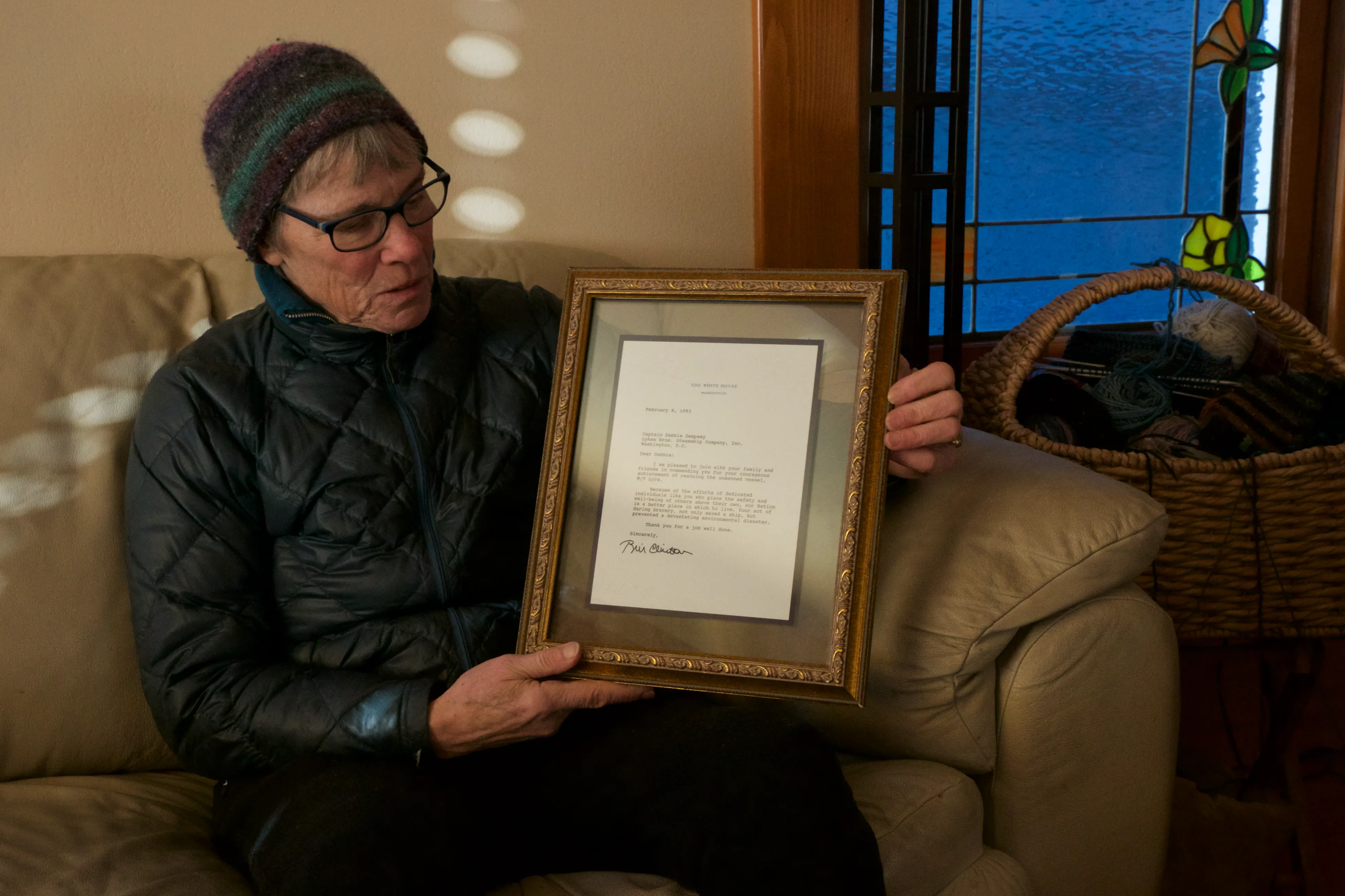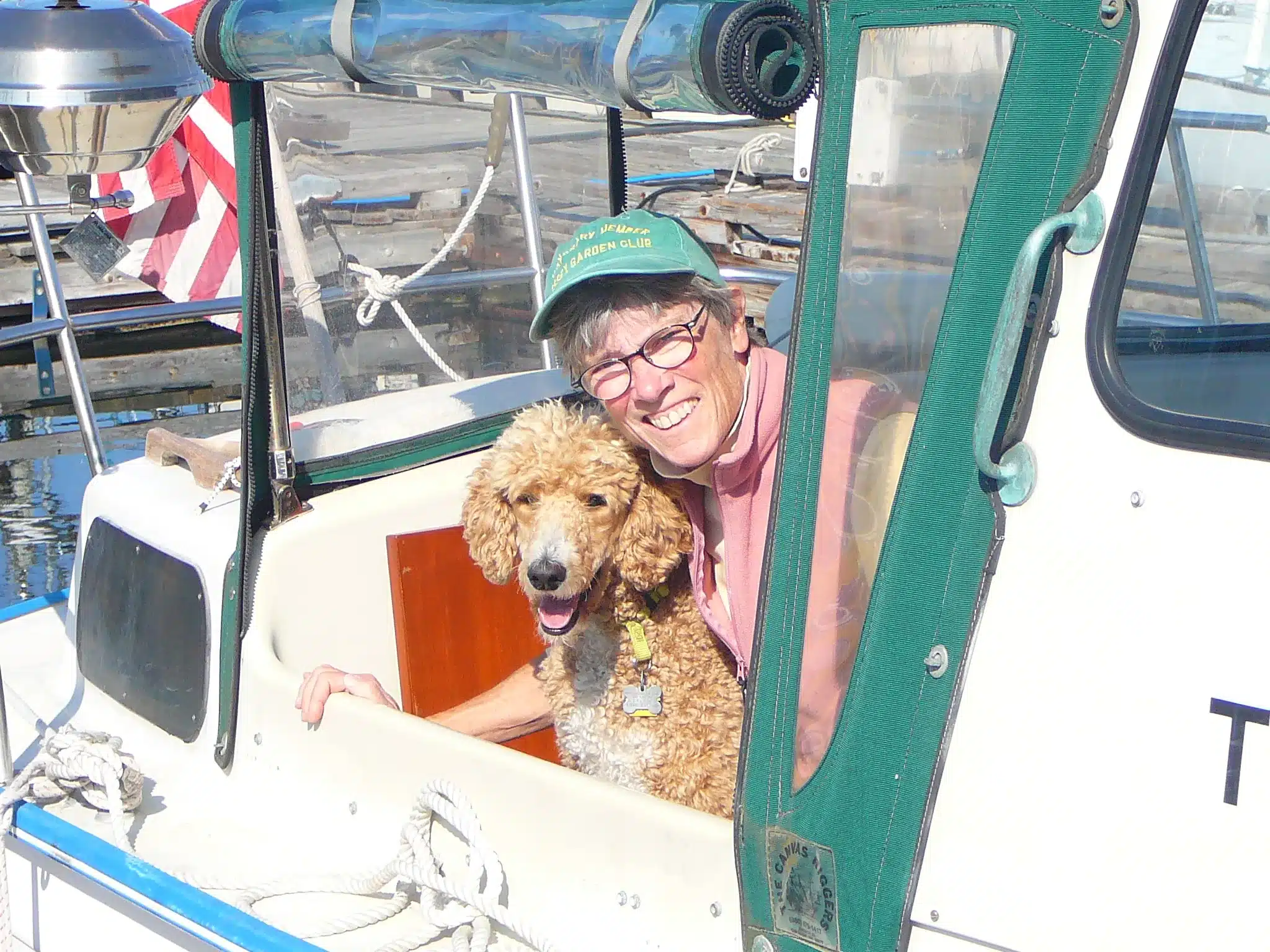Deb Dempsey is a legend in the maritime industry. From being the first woman to attend the Maine Maritime Academy, to becoming an elite pilot guiding ships over the dangerous Columbia Bar, to founding the Community Boating Center in Bellingham, Deb has been braving new waters—and blazing a path for others—for decades.
Deb’s interest in maritime started in Essex, Connecticut, where her parents and their friends started a youth sailing program. In their early teens, Deb and her siblings started sailing small, garage-built Blue Jay boats. By the time she was 19, they were racing a Tartan 27 in national competitions on Cape Cod Bay.
Deb went on to graduate from the University of Vermont with a bachelor’s degree in chemistry, minoring in mathematics. After college, she “became a bum” and used her sailing skills to deliver yachts spring through fall. In 1973, inspired by a sibling’s encouragement, she called the Maine Maritime Academy and asked to apply.
At the time, there were no other women at the academy, but Deb wasn’t deterred. In October, she rode the train from her dock in Maryland to visit the school in Maine for an interview. After her interview and in response to new laws addressing sex-based discrimination, the academy held a board meeting to determine whether they would admit her. In 1974, Deb would become the first woman to join the academy.
Maine Maritime Academy
Deb was 25 when she joined the academy—five years older than most of her classmates. She already had a degree and was a more seasoned sailor than most of her classmates from her time delivering yachts. At the academy, she worked in the library and on the shore, catching lines for other students docking boats. She found the mathematics of celestial navigation particularly fascinating, and in working with the instructor, she created professional connections within the maritime industry.



“It took me six months to get one of my professors to look me in the eye,” Deb said. “They saw my determination, they saw my work ethic, they saw how enthused I was, and I found my niche.”
Deb’s niche turned out to be piloting massive container ships and oil transports. After college, she started operating oil tankers and working for a marine shipping company.
A Woman of Firsts
From there, it was “first woman third mate, first woman second mate, first woman chief mate, first master, first pilot, on and on and on,” Deb recalled. She found herself on a career of firsts and earned national renown for the harrowing rescue of a ship that could have caused an oil spill of catastrophic proportions in North Carolina. Her impressive resume and reputation earned her a job with the Columbia River Bar Pilots Association.
According to Deb, there’s not a lot of ship handling to be had when you’re crossing the Atlantic or Pacific Oceans. Therefore, the captains bringing container ships across long distances often rely on locally-trained experts to guide their massive boats into port. Pilots, who guide ships through difficult regions of canals, rivers, bays, and docks and coordinate tugboats with the ship’s crew, do ship handling “day in and day out.”
“It’s a long, long process to become a pilot,” said Deb. “Pilots are the experts for that particular body of water. We’ve all drawn the chart that we have to work from memory—you always have a plan B in your pocket.”
The Columbia Bar pilots have some of the most challenging piloting jobs in the world, navigating ships over the treacherous entrance to the Columbia River. The complicated sand bars and narrow pathways through the channel mean that it takes extensive knowledge, experience, and passion to become one of the few Columbia Bar pilots.



“For the Columbia Bar, it’s two years offshore sea time on an unlimited [tonnage] master’s license, which means you have a ton of experience up your butt,” said Deb. “It’s a privilege to be in a position to become a pilot, because it really takes 15, 18 years for us to get qualified.”
On April Fool’s Day 1994, Deb got a call from her best friend and president of the Columbia River Bar Pilots Association, Captain Paul Jackson, offering her a position. She took the job and eventually moved to Bellingham. From there, she commuted to Astoria, Oregon, whenever she had a block of shifts piloting on the Columbia River. During that time, she and her partner co-founded the Community Boating Center (CBC) in Bellingham.
Community Sailing
Since 2007, the CBC has served Bellingham and surrounding areas by providing low-barrier access to watercraft and sailing. “The Community Building Center is unique because we are all about access for all. We are not a yacht club. There’s no membership, there are no dues…. We exist for the 90% of Bellingham that don’t have the knowledge, the means, or the skills of how to use their backyard, Bellingham Bay,” said Deb.
It’s been 17 years, and Deb is still involved with the CBC. Deb helped the CBC survive the challenge of the COVID-19 pandemic and has found residents have a “newfound appreciation for outdoor recreation.” Today, she serves on the board of directors as their treasurer. Describing a newly funded program to provide access to water for people who use wheelchairs, she speaks with pride and satisfaction about the organization she helped found.
“Quite frankly, half the reason that I moved up to Bellingham was to start a community boating center,” said Deb. “There was such a need. If you didn’t have the means or belong to a club or something, you couldn’t get on the water.”
Deb sees herself as a mentor for young people who are interested in maritime careers, regardless of their gender. According to Deb, of the approximately 1,300 ship pilots in the United States, only a small percentage are women. She would like to see that percentage grow. “The more, the better. The whole point is the option.”
“If you have a path for being on the water, working on the water, or recreating on the water, there are ways to make it happen,” Deb said, including “coming up through the hawespipe,” apprenticeships, maritime academies, and more.
If you liked this story, you might enjoy other stories about Women on Washington’s Working Waterfronts. Hear from Courtney Hart, who works for the Port Gamble S’Klallam Tribe to balance the interests of all those who harvest from Washington’s shore, or read the story of Thea Foss, who pioneered one of the world’s largest tugboat companies, starting with just a rowboat.







